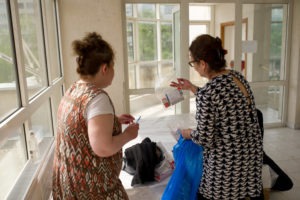 To learn more about our work supporting refugees, visit Our Support for Ukraine.
To learn more about our work supporting refugees, visit Our Support for Ukraine.
“Keystone Moldova has taken a pro-active approach to supporting refugees with disabilities,” said Dr. Ludmila Malcoci, Regional Director of Keystone Human Services International and Executive Director of Keystone Moldova. “We are working to ensure that people with disability are included in emergency response action plans.”
Dr. Malcoci spoke about Keystone Moldova’s work supporting refugees from Ukraine during two side events at the 15th session of the Conference of States Parties to the Convention on the Rights of Persons with Disabilities:
Supporting People with Intellectual Disabilities and their Families in Ukraine
Organized by Inclusion Europe and Inclusion International in collaboration with International Disability Alliance, Keystone Human Services, EU Mission to the UN, Permanent Mission of Poland to the UN.
Innovative Practices in Disability Inclusive Disaster Risk Reduction
Sponsored by Christian Blind Mission with co-sponsors Zero Project, Access Israel, and Enosh – The Israeli Mental Health Association
Since the beginning of the war in Ukraine, Keystone Moldova has been supporting refugees from Ukraine, providing meals at customs in Palanca, Moldova, and partnering with IsraAID to provide a tent at the border where children, mothers, and grandparents can play, eat, and access information, referrals to other services, and supplies. In addition to providing immediate support, our goal is to ensure people with disability are included in relief efforts.
Because people with disability—especially women with disability—are at risk of abandonment, violence, and death during a crisis and often lose access to information and resources, we advocated for the United Nations High Commissioner for Refugees (UNHCR) to establish a specific taskforce on disability. Keystone Moldova is now leading this taskforce, which includes governmental representatives, UN agencies, international and national NGOs, and refugees with disabilities from Ukraine. This mechanism is including disability rights and issues in all sectoral groups: education, health, cash assistance, transportation, customs, and more. It has also served as a way to advocate for better inclusion of people with disabilities.
Building on our existing services, we expanded the Hotline Support Service so refugees with disabilities and their families and supporters could access information, counseling, legal support, direct support services, and referrals to other services twenty-four hours per day.
Keystone Moldova also developed mobile team services, which include a medical doctor and a social worker, to map the needs of refugees with disabilities and provide support, including health care services and medication, assistive equipment, specific nutrition such as gluten-free or sugar free, rehabilitation services, support for documentation, and mediation with other services.
There is still much work to be done, though. In the entire country, there are only two accessible vans, making transportation for people with disability very challenging. Because shelters are not accessible, it is difficult for people with disability to navigate kitchens, bathrooms, and the buildings themselves. Although refugees can access family doctors, they are often unable to pay for needed medications and diagnostic services, as well as special nutritional needs or assistive equipment.
“We are also thinking of people’s long-term needs,” said Dr. Malcoci. “Many people cannot return home in Ukraine, so we need to develop support services to better integrate people with disabilities from Ukraine into schools and the labor market.”
How can you help? Because people’s needs are changing, the best way you can help is through donations so Keystone Moldova has the flexibility to address people’s needs as they arise. You can donate and make a difference here.


 To learn more about our work supporting refugees, visit
To learn more about our work supporting refugees, visit